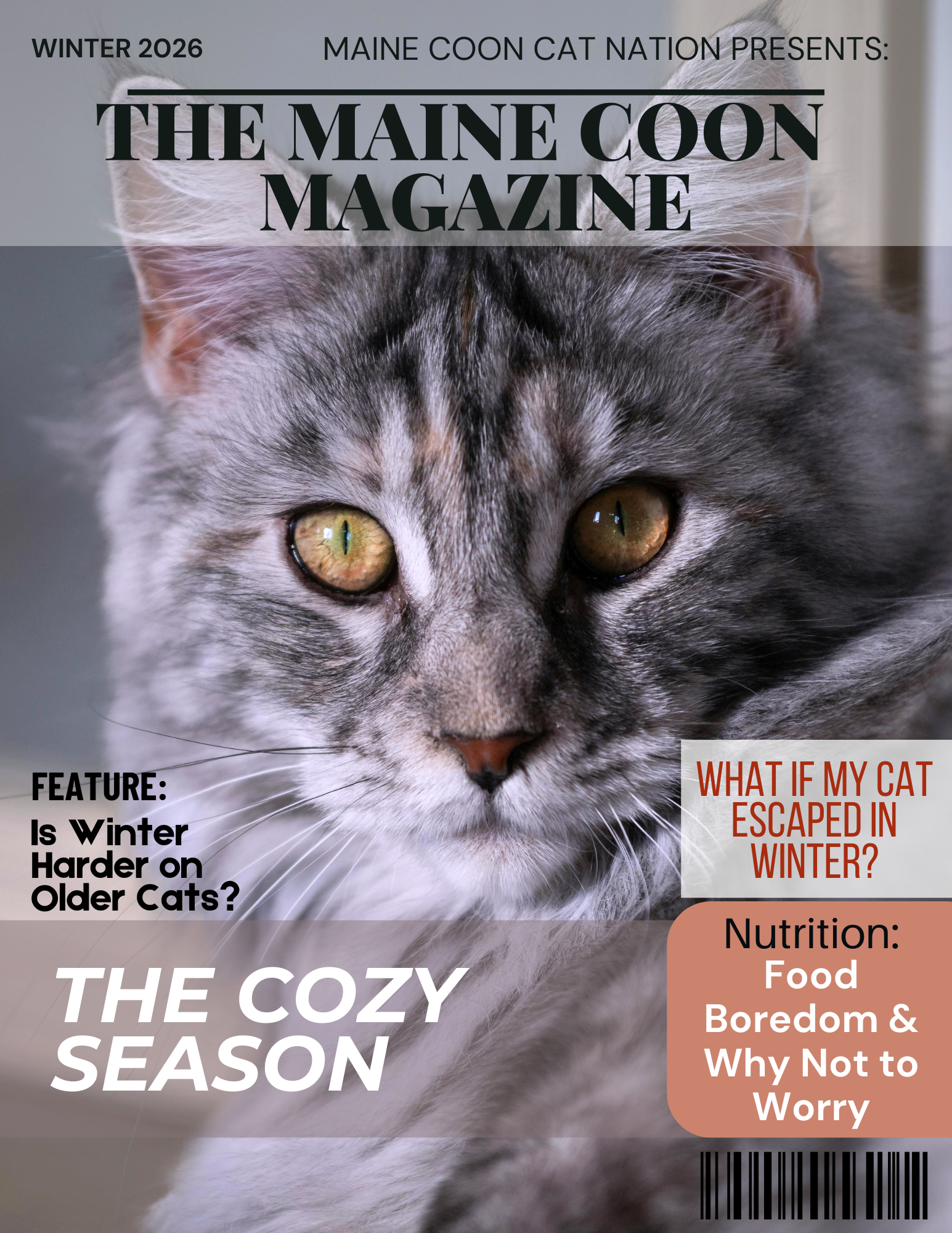- Home
- Health Care
- Cat Hairballs
Why Do Cats Get Hairballs?
Help For Your Longhaired Cat
Why do cats get hairballs? They result in worry, discomfort and vomiting. A furball remedy may help eliminate hairballs in Maine Coons and other longhaired breeds.
If your cat is coughing, hacking, and if you find your cat vomiting more than occasionally, chances are good that he might is suffering from a hairball problem.
If you can't get enough of Maine Coons, you'll love our fun, free Daily Digest!

The more fur a cat has, the higher the chance he will be plagued by hairballs.
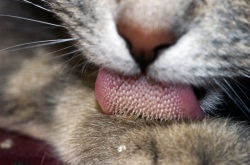
Cat hairballs are more than a nuisance! They result in worry (for us), discomfort (for him), and cat vomiting (yuck!).
Maine Coon cats, and other long or medium-haired cats, are prone to them. How does this happen? They are very clean and tidy animals.
They groom themselves meticulously. Watching a Maine Coon groom himself, you may think "There's no way he's going to get all that fur!"
And you'd be right. These cats really do need a bit of assistance in the grooming department.
If left to their own devices, they will end up matted right down to the skin, and throwing up balls of fur on your favorite rugs regularly.
"Why Do Cats Cough Up Hairballs?"
The short answer is that they swallow their fur when grooming themselves.
Even shorthaired cats can be afflicted. How and why does this happen?
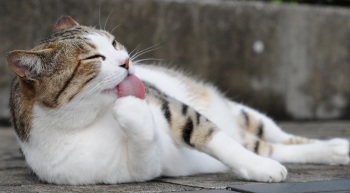
We've all marveled at the unique texture of a cats tongue, right? It is just like a small brush. And that's for a very good reason.
The tongue is designed just for that; it's a built-in grooming tool.
When a cat grooms himself, all the loose hairs that are ready to be shed come out.
When we brush a cat, the brush quickly becomes full of excess fur. When he grooms himself with his tongue the same thing happens. But here is his problem: he can't "clean the brush" like we can.
His tongue removes the old, shedding fur, but where will it go? Down the hatch, unfortunately. Cats are unable to spit it out; they have no choice but to swallow it.
Then it builds up, doesn't digest, and the rest is history!
"How Do I Know If My Cat Has Hairballs?"
There is the dry cough. It has a kind of hacking sound. If she doesn't vomit, you may think you are in the clear, but beware!
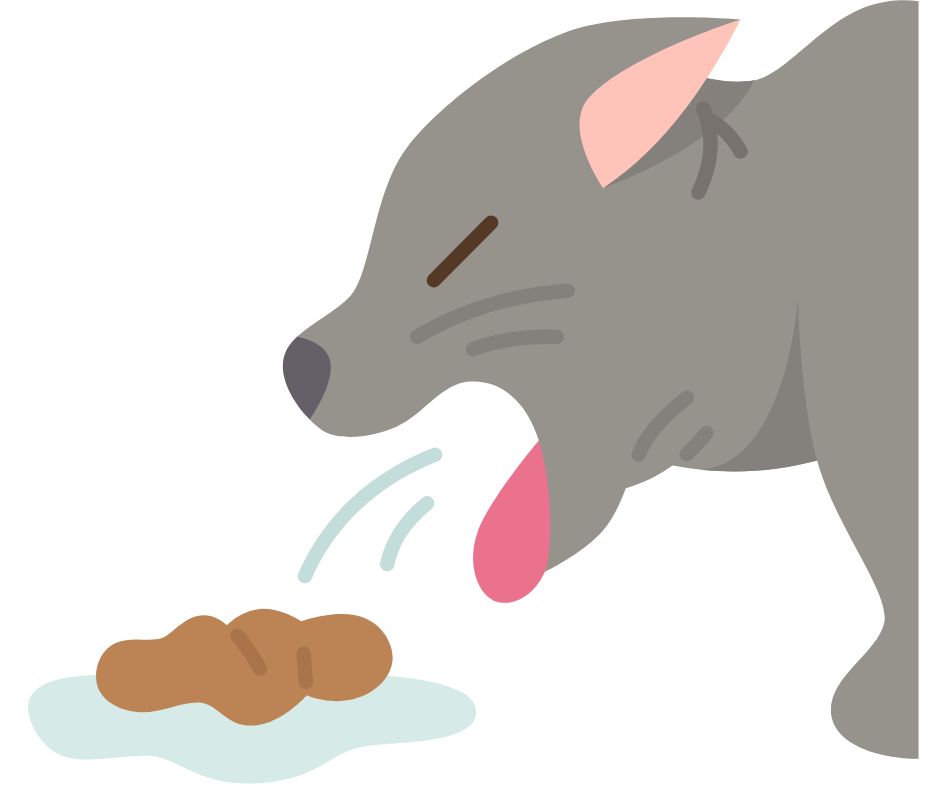
They look just like poops a lot of the time!
So before you assume she's taken on some bad litter box behavior, consider a different culprit.
They are long, tubular, wet, gross things.
5 Common Symptoms of Hairballs
Frequent Coughing or Gagging:
If your cat is making hacking or gagging sounds, it could be trying to expel a hairball. This is often the most obvious sign.
Vomiting:
Cats will sometimes vomit to get rid of them. If you notice your cat vomiting hair or a cylindrical mass, it’s likely a hairball.
Loss of Appetite:
Hairballs can sometimes cause digestive discomfort, leading to a reduced interest in food.
Constipation or Diarrhea:
They can also cause blockages in the digestive tract, leading to constipation. On the other hand, if a hairball passes through the system, it might result in diarrhea.
Lethargy:
If your cat seems unusually tired or less playful, it might be feeling uncomfortable due to hairballs.
"Does My Cat Have a Hairball Blockage?"
Usually, you find your cat vomiting up the hairball, and he feels better. But if your longhaired cat regularly coughs and gags, but nothing comes up, you may suspect a hairball blockage.
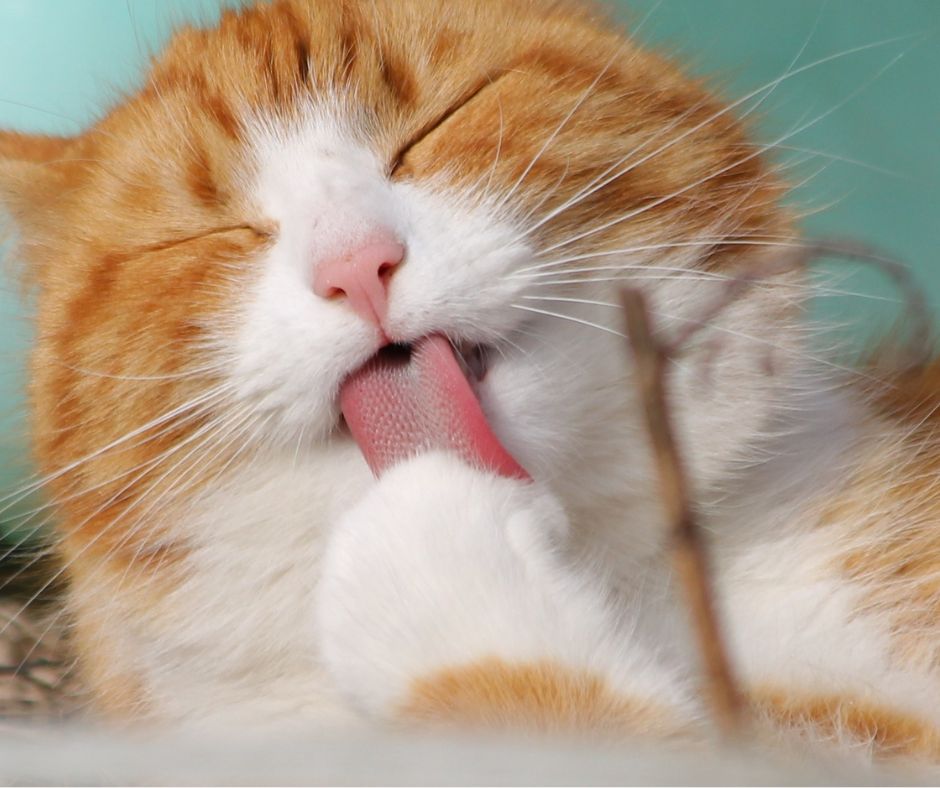
In the early stages, a good hairball remedy should do the trick and get the offending hairball out.
Additional signs to look for would be bad breath, lethargy, weight loss and loss of appetite, diarrhea or constipation. These could indicate a later stage of hairball blockage.
If these symptoms are present, it's very important to go to the vet. In later, more extreme stages, a hairball blockage in cats may require surgery for removal.
Hairball Blockage Symptoms
Frequent and Unproductive Retching:
Your cat may gag or retch repeatedly without bringing up a hairball.
Persistent Vomiting:
If your cat is vomiting more than usual, especially without producing food or hair, this could indicate a blockage.
Loss of Appetite:
A blockage can cause discomfort or nausea, leading your cat to refuse food.
Lethargy:
Your cat may seem unusually tired, less active, or less interested in normal activities.
Abdominal Pain:
Cats might show signs of pain, such as meowing, growling, or avoiding being touched around the abdomen.
Changes in Bowel Movements:
Constipation is a common sign of a blockage. Conversely, diarrhea might occur as the digestive system struggles to move contents past the blockage.
Immediate Actions:
Observation:
Monitor your cat’s behavior closely. Take note of any changes in eating, grooming, or litter box habits.
Hydration:
Ensure your cat is drinking water. Dehydration can worsen the situation.
Consult Your Vet:
If you observe these symptoms, it’s crucial to contact your veterinarian promptly. They can perform diagnostic tests, like X-rays or ultrasounds, to determine if there is a blockage.
Veterinary Intervention
Treatment:
If a blockage is confirmed, your vet might recommend treatments ranging from medication to help pass the hairball to more serious interventions like surgery, depending on the severity.
Hairball blockages are a medical emergency. Timely veterinary care is essential to ensure your cat's health and well-being.
Why Do Cats Get Hairballs? (FAQ's)
What causes hairballs in cats?
What causes hairballs in cats?
They are primarily caused by cats grooming themselves and ingesting loose fur, which can accumulate in the stomach.
Are hairballs normal for cats?
Are hairballs normal for cats?
Yes, hairballs are generally normal for cats, especially those with long hair. However, frequent occurences may indicate an underlying issue.
How often should my cat have hairballs?
How often should my cat have hairballs?
This varies, but occasional hairballs (once a month) are typically normal. Frequent incidents (several times a week) could signal a problem.
Can hairballs be dangerous for my cat?
Can hairballs be dangerous for my cat?
While mostly harmless, they can sometimes cause blockages in the digestive tract, which can be serious and require veterinary attention.
What can I do to prevent hairballs?
What can I do to prevent hairballs?
Regular grooming, a specialized diet, and hairball remedies can help reduce the occurrences.
What are the symptoms of a hairball blockage?
What are the symptoms of a hairball blockage?
Symptoms include frequent unproductive retching, persistent vomiting, loss of appetite, lethargy, abdominal pain, and changes in bowel movements.
Should I be concerned if my cat is vomiting hairballs frequently?
Should I be concerned if my cat is vomiting hairballs frequently?
Yes, frequent vomiting could indicate a more serious issue and should be discussed with your veterinarian.
Are certain cats more prone to hairballs than others?
Are certain cats more prone to hairballs than others?
Long-haired cats and cats that groom excessively are more prone to this issue. Older cats might also be more affected due to changes in grooming habits.
Can diet help with hairballs?
Can diet help with hairballs?
Yes, diets high in fiber can help pass hair through the digestive system more easily, reducing their formation.
What hairball remedies are safe for cats?
What hairball remedies are safe for cats?
Over-the-counter hairball remedies, usually in the form of gels or pastes, can be safe and effective. Always consult your vet before starting any new treatment.
How can I tell if my cat's vomiting is due to hairballs or something else?
How can I tell if my cat's vomiting is due to hairballs or something else?
Hairball vomit typically contains fur and might be cylindrical. If vomiting persists without signs of hair, consult your veterinarian to rule out other issues.
"What Can I Do To Eliminate Cat Hairballs?"
This is no way for a cat to go through life. For the sake of your home, and especially for your poor cats comfort, you are probably on the hunt for a good hairball remedy.
Finding the right hairball treatment and keeping to a schedule will make a world of difference.
Making cat hairballs a thing of the past is the key to a happy cat and a happy owner, too. It is so worth it!
Preventing and treating hairballs in cats naturally involves a combination of regular grooming, dietary adjustments, and lifestyle changes that can significantly reduce their frequency and severity.
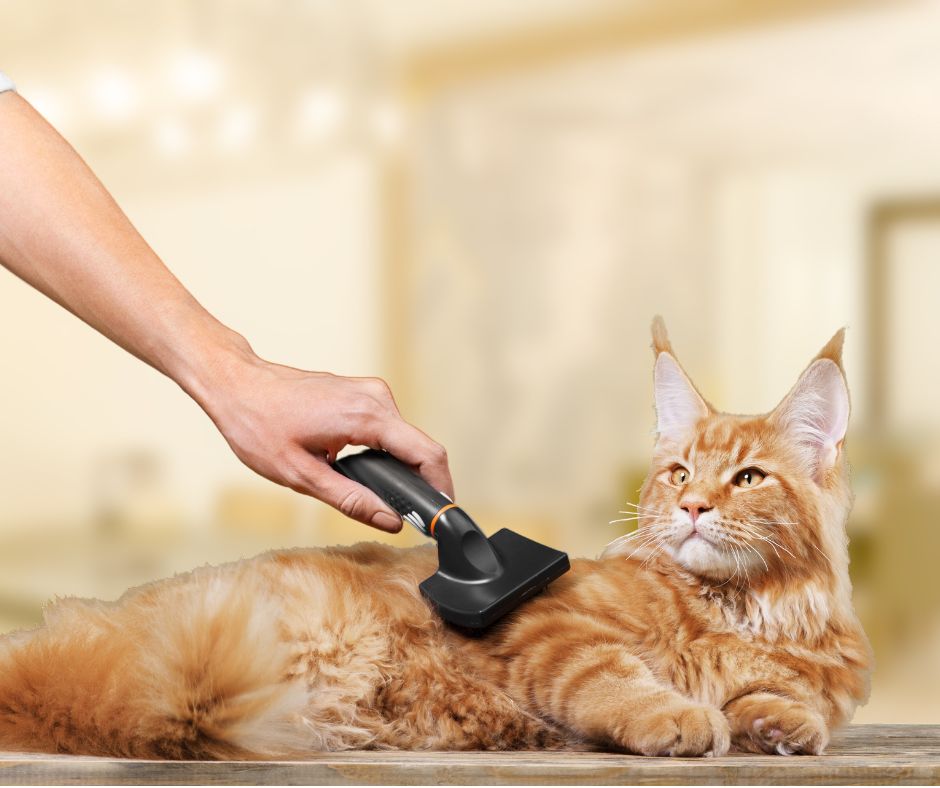
Grooming:
First and foremost, regular grooming is essential. Brushing your Maine Coon daily, especially if it has long hair, can help remove loose fur before your cat ingests it during grooming.
This reduces the amount of hair that can potentially form hairballs. A grooming routine also allows you to check for any skin issues or excessive shedding, which can be addressed early on.
For cats that are not fond of brushing, you can use grooming gloves or even take them to a professional groomer for regular care.
Diet:
Diet plays a crucial role in preventing hairballs. Feeding your cat a high-fiber diet can help the digestive system process ingested hair more efficiently.
Fiber aids in moving hair through the gastrointestinal tract, minimizing the chance of hairballs forming.
You can incorporate fiber into your longhaired cat’s diet by choosing commercial cat foods designed specifically for hairball control or by adding natural sources of fiber like pumpkin, sweet potato, or a small amount of bran to their regular food.
Additionally, ensuring your cat stays well-hydrated is vital, as proper hydration supports overall digestive health and helps prevent hair from clumping together in the stomach.
Introducing natural supplements and remedies can also be beneficial.
Adding a teaspoon of olive oil or a bit of butter to your cat’s food once a week can lubricate the digestive tract, helping hair pass through more easily.
Similarly, a small amount of fish oil can improve skin and coat health, reducing shedding and the amount of loose hair available for ingestion.
Lifestyle:
Encouraging play and exercise can help maintain a healthy digestive system.
Active cats are generally healthier and have more regular bowel movements, which can help pass ingested hair more effectively.
Providing a stimulating environment with plenty of toys and opportunities for physical activity can make a significant difference.
If your cat is prone to hairballs, consider incorporating natural hairball remedies available in pet stores.
These are often in the form of malt-flavored gels or pastes that kitty can lick off a spoon or your finger. These products are designed to help hair pass through the digestive system smoothly.
Regularly observing your Maine Coon’s behavior and grooming habits can help you identify any issues early on.
If despite these natural interventions, your cat continues to struggle with hairballs, it is important to consult with your veterinarian.
They can rule out underlying health problems and provide additional treatment options if necessary.
By combining these natural prevention and treatment strategies, you can significantly reduce the occurrence of hairballs and improve your longhaired cat’s overall health and well-being.
By using these strategies, you can keep your Maine Coon comfortable and healthy, and greatly reduce the chances and problems of hairballs.
Next:
Our next page, hairball remedy options, is full of advice on eliminating hairballs in cats.
Also, we have visitor-created pages dealing with hairballs. Visit our page of Cat Hairball Q & A's to read about the following personal experiences questions such as "Why do cats get hairballs?" and advice shared by our community:
- Problem With Hairballs
- Coughing Issues
- Scary Episode
- Dry Cough And Furballs
Top of: Why Do Cats Get Hairballs?
« Back to Maine Coon Health
